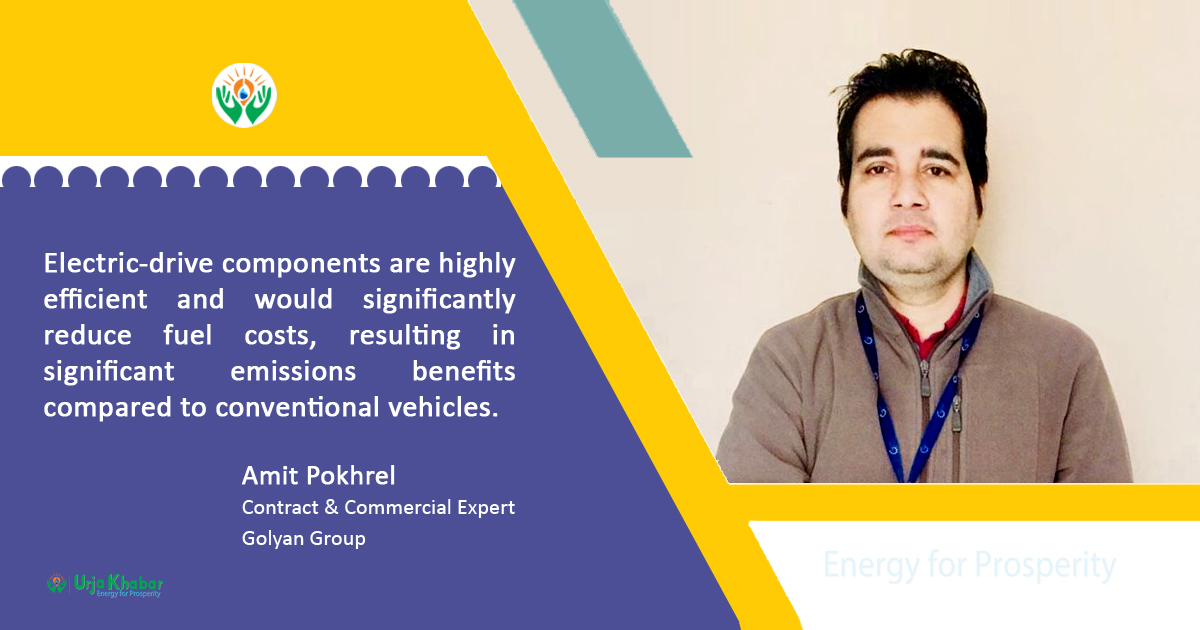
Transport has a very important role in the socio-economic development of any county. Transport sector is a huge consumer of energy; it remains the largest consumer of petroleum-based fuels, accounting to 20% of global final energy consumption and 60% of total oil consumption.
On the other hand, more than one third of the total greenhouse gas emission comes from the transport sector. This has not only exerted a strong pressure on the depleting resource but it also has huge negative impacts on environment and adverse effects on human health. Ever growing transport sector has been constantly exerting pressure on the oil dependence as well as resulting in the environmental externalities. One of the measures, to relax the dependence on the petroleum products and thereby mitigate the environmental impacts, is to ensure the gradual replacement of the conventional vehicles with electric vehicles. There are number of issues associated with the use of electric vehicles.

Nepal is no exception to the rest of the world when it comes to the increasing popularity of Electric Vehicles (EVs). In recent years, the country has seen an exponential increase in EV adoption due to the need to reduce carbon emissions and to contribute to the global effort to combat climate change. An important factor in the growth of EV adoption in Nepal is the availability of cost-effective and dependable electric vehicles. Historically, EVs were associated with high costs and unreliable performance, however, this has been alleviated by the emergence of a variety of manufacturers that offer an affordable and dependable range of electric vehicles.
The use of fossil fuels is becoming increasingly limited and is having a negative impact on the environment. The toxic emissions produced by petrol and diesel vehicles are having a long-term negative impact on public health. Electric vehicles have a much lower impact on emissions than petrol and diesel vehicles. In terms of efficiency, electric vehicles can absorb approximately 60% of the electricity from the grid to propel the vehicle, whereas petrol and diesel cars are only able to convert 17%-21%. This is a waste of approximately 80% of the electricity stored in the fuel. Fully electric vehicles have no tailpipe emissions, however, even when taking into account the production of electricity, petrol and diesel vehicles emit nearly 3 times more CO2 than the average electric vehicle.

Electric vehicles offer a range of advantages over traditional vehicles, such as no gears, simplified controls, and silent operation. To charge, electric vehicles can be plugged into home or public charging stations. Additionally, they are quieter than traditional vehicles, due to the absence of an engine beneath the hood. The electric motor is so quiet that manufacturers must add false sounds to make it safe for pedestrians. However, they also offer limited driving range, a long recharge time, and low speeds. To ensure the successful deployment of electric vehicles, it is important to ensure that there are sufficient charging stations available. Electric vehicles, on the other hand, are more energy-efficient than the conventional ones. As a result, they result in lower fuel costs. They also play an important role in reducing emissions. Electric vehicles can help in reducing dependence on imported oil products and can therefore help in ensuring energy security. In addition, electric vehicles help in reducing transport-generated noise pollution as well as other negative environmental effects.
As the economic growth accelerates, the energy consumption increases rapidly, resulting in an increase in import dependency. The inefficient use of energy to sustain this economic growth further increases the rate of energy consumption with the resulting environmental degradation. Energy conservation is an essential component of energy security. Knowing the importance of minimizing the losses of this precious commodity, where possible, an entire supply chain management approach was implemented, from the source to the end user level. The initial planning was crucial for the process. Government of Nepal will adopt the principles of implementation of the Electric Vehicle in Nepal so as to reduce the consumption of fuel, which is very important for the local population.
It is essential to incorporate as much renewable energy sources as possible into the domestic energy mix in order to reduce the reliance on fossil fuels and to generate employment. Furthermore, renewable energy sources are more environmentally friendly and less polluting. Having access to and the ability to utilize renewable energy sources in an efficient manner is essential for enhancing quality of life, as it will have a positive effect on the availability of effective and high-quality services for health care, education, and other societal and economic activities.
Benefits of Use and Practicing Electric Vehicle in Nepal
The utilization of electric vehicles has seen a rapid increase in Nepal since 2022. This is due to the numerous advantages associated with the use of electric vehicles, which would enable families to rely on them rather than investing large sums of money in both petrol and diesel-branded and standard models. The advantages of using electric vehicles are lower running costs, lower maintenance costs, better performance, zero tailpipe emissions, easy to drive and quiet, convenience of charging at home and no fuel, no emissions,
Back in the day, electric vehicles (EVs) were considered to be a pipe dream. Over the years, however, manufacturers have started to produce EVs that are not only aesthetically pleasing but also perform better than their fuel-powered counterparts. Electric Vehicles (EVs) weigh less than a car and have a much faster 0-60 mph time than a gas-powered vehicle. EVs also emit no tailpipe emissions. You can reduce your carbon emissions further by charging your EV with renewable energy.
Electric vehicles (EVs) are designed with fewer moving parts and straightforward controls, making them easy to drive. They can also be plugged into a public or private charging station when needed. Additionally, EVs are quieter than fuel-powered vehicles, thus reducing the sound levels generated. Drivers no longer need to visit petrol stations to fill up with fuel, as they can charge their EV at home. Thanks to modern charging technology, EVs can be charged quickly or even with battery swapping services, allowing drivers to continue driving without worrying about conventional fuel availability. One of the greatest benefits of EVs is their environmental impact. Pure EVs have no tailpipe emissions, thus reducing air pollution. As the electric motor of an EV operates in a closed circuit, there are no harmful gases emitted by the vehicle. With fewer moving parts, EVs offer the potential to convert spaces into storage and provide larger cabin room. EVs can also provide additional storage space under the hood, as there is no longer a need for conventional ICE. EV motors and batteries do not take a lot of space compared to fuel-powered vehicles.
Nepal’s Environment-friendly vehicle and transport policy 2014 aims to provide a grant scheme for promoting the use of electric vehicles as well as non-motorized vehicles. The plan states that the government will support the conversion of fossil fuel-powered vehicles into electric vehicles, as well as support for industries involved in manufacturing, researching and developing electric vehicles, and promoting the use of alternative modes of transport in the transportation system.
The world's most polluted cities can benefit from the introduction of electric vehicles (EVs) as a means of reducing local air pollution and greenhouse gas emissions, as well as the use of fossil fuels in the transport sector. Kathmandu Valley has become the first in the list of most polluted cities in the world in terms of air pollution. This level of pollution is considered very unhealthy for public health. The current PM2. 5 concentrations in Nepal are 1.9 times above the recommended limit given by the WHO 24 hrs air quality guidelines value.
By combining renewable energy with EVs, cities can achieve zero emissions at the exhaust system and significantly lower emissions throughout the life-cycle. If the transport and road congestion problems are not addressed in time, the road congestion problems may worsen, even after EVs are substituted for conventional vehicles in the future. A rapid increase in the number of EVs on the roads would be a major factor in reducing vehicle greenhouse gas emissions. Electric-drive components are highly efficient and would significantly reduce fuel costs, resulting in significant emissions benefits compared to conventional vehicles. With several countries pledging to gradually reduce their dependence on petrol and diesel (fossil fuels), EVs are considered a sustainable alternative.
The author is a project expert who has been contributing to the of Golyan Group
Reference:
1. The Growth of Electric Vehicles in Nepal - Understanding the Market and Industry Adoption - Nepal Database
2. Promoting EVs in Nepal offers opportunities, but you also need to address challenges together - OnlineKhabar English News
3. Encouraging Electric Vehicle Use in Nepal | New Spotlight Magazine (spotlightnepal.com)
4. Electric vehicles gaining traction in Nepal | Nepalnews
5. 10 Advantages of Electric Cars (topspeed.com)
6. Nepal Air Quality Index (AQI): Real-Time Air Pollution Level
7. 25 Most Polluted Cities in the World (2023 Rankings) – Smart Air (smartairfilters.com)
